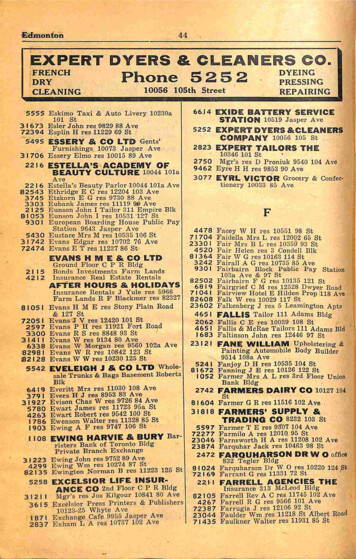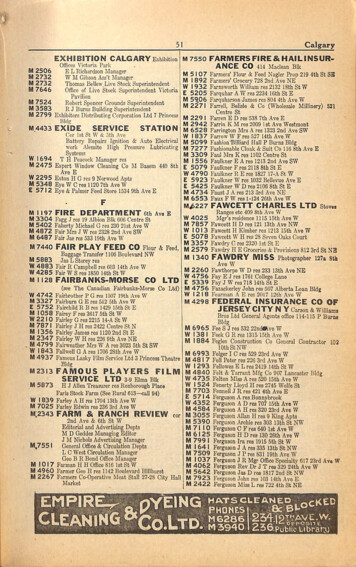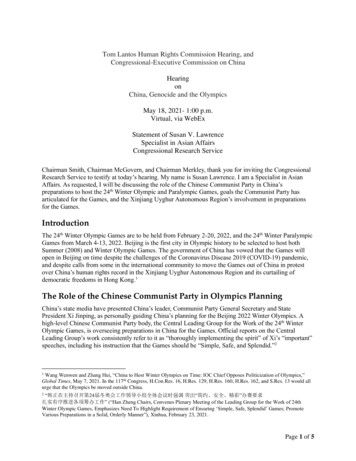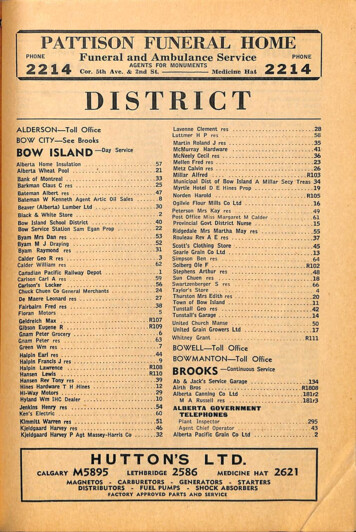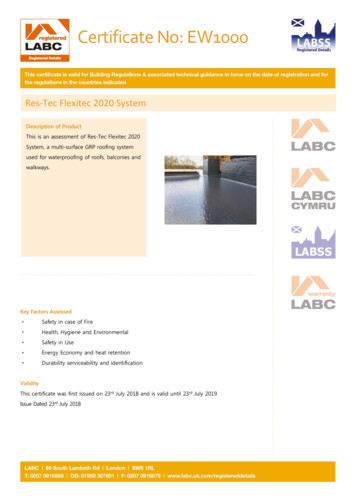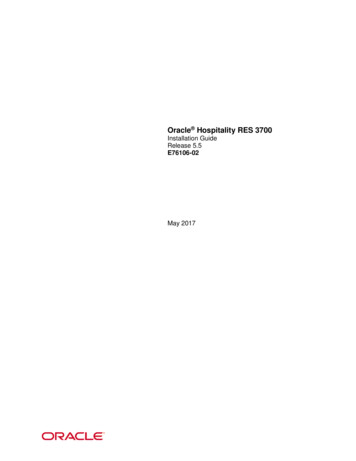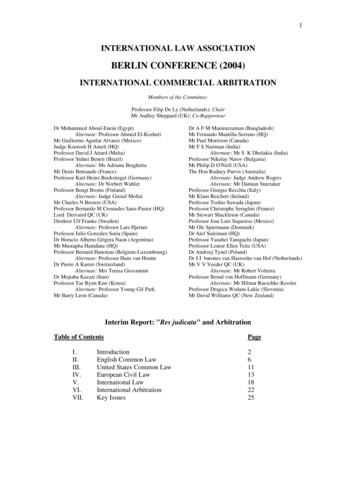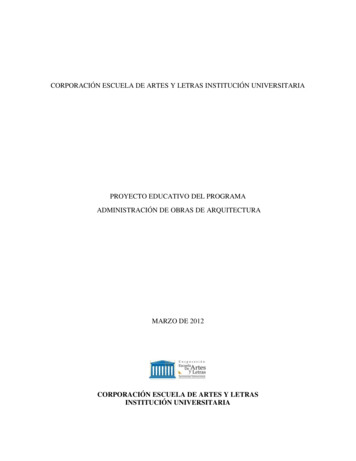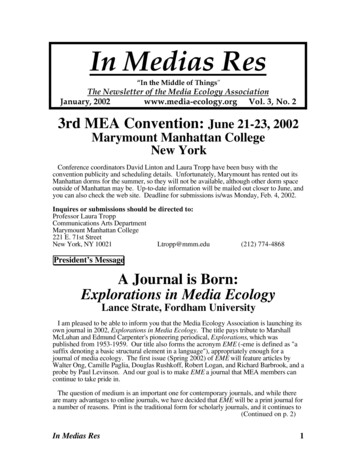
Transcription
In Medias Res“In the Middle of Things”The Newsletter of the Media Ecology AssociationJanuary, 2002www.media-ecology.org Vol. 3, No. 23rd MEA Convention: June 21-23, 2002Marymount Manhattan CollegeNew YorkConference coordinators David Linton and Laura Tropp have been busy with theconvention publicity and scheduling details. Unfortunately, Marymount has rented out itsManhattan dorms for the summer, so they will not be available, although other dorm spaceoutside of Manhattan may be. Up-to-date information will be mailed out closer to June, andyou can also check the web site. Deadline for submissions is/was Monday, Feb. 4, 2002.Inquires or submissions should be directed to:Professor Laura TroppCommunications Arts DepartmentMarymount Manhattan College221 E. 71st StreetNew York, NY 10021Ltropp@mmm.edu(212) 774-4868President’s MessageA Journal is Born:Explorations in Media EcologyLance Strate, Fordham UniversityI am pleased to be able to inform you that the Media Ecology Association is launching itsown journal in 2002, Explorations in Media Ecology. The title pays tribute to MarshallMcLuhan and Edmund Carpenter's pioneering periodical, Explorations, which waspublished from 1953-1959. Our title also forms the acronym EME (-eme is defined as "asuffix denoting a basic structural element in a language"), appropriately enough for ajournal of media ecology. The first issue (Spring 2002) of EME will feature articles byWalter Ong, Camille Paglia, Douglas Rushkoff, Robert Logan, and Richard Barbrook, and aprobe by Paul Levinson. And our goal is to make EME a journal that MEA members cancontinue to take pride in.The question of medium is an important one for contemporary journals, and while thereare many advantages to online journals, we have decided that EME will be a print journal fora number of reasons. Print is the traditional form for scholarly journals, and it continues to(Continued on p. 2)In Medias Res1
President’s Message (cont.)be invested with a kind of legitimacy thatonline journals lack. Print has been ourmost successful medium for intellectualdiscourse, our most left-brained of mediaas it were, and most certainly the easiest toread. Print balances portability withpermanence, and there is much to be saidfor the look of a series of journals linedup on a bookshelf, and for the pleasantsurprise of receiving the latest issue in themail. And, of course, it will still bepossible to archive EME in electronicand/or online form in the future.The decision to go with printhas its cost. Our regularmembership fee has been raisedto 40, and our student fee to 20 to cover the cost of thesubscription to the journal.Under the new arrangements, annualmembership will entitle individuals twoissues of EME (as the journal will initiallybe published biannually), two issues ofour newsletter, In Media Res, and ourannual convention. While I would expectthat few would welcome an increase indues, I hope you will agree that the newfees are still quite reasonable for anassociation such as ours, and now providea reasonable return for your investment.It is, after all, an investment in the futureof media ecology as a discipline, as wenow have a means for refining ourthought, disseminating the best of ourwork, keeping our membership abreast ofdevelopments in our field, andestablishing media ecology within thelarger scholarly community. And it is aninvestment in the MEA itself, as theaddition of an official journal is the lastmajor hurdle in establishing ourselves asa scholarly society.So please send in your dues if you havenot done so already, to support yourassociation, and to insure that you receiveyour copies of EME as soon as they areavailable. I also want to invite ourmembers to submit their work to EME,and to encourage others to do so.In Medias ResIn Medias Res is a benefit for MEA members.Inquiries about and/or contributions to thisnewsletter should be addressed directly to itsEditor. The images used herein were obtainedfrom IMSI"s MasterClips (c) Collection, 75Rowland Way, Novato, CA 94945. Thisnewsletter was supoorted by a generous grantfrom Dean Thomas Bohn of the Park School ofCommunications, Ithaca College.EditorRaymond Gozzi, Jr., Ithaca Collegegozzi@ithaca.eduMailing LabelsJanet Sternberg, Fordham UniversityMEA Executive CommitteePresident, Lance Strate, Fordham UniversityVice President, Casey M.K. Lum, Wm. PatersonUniversityTreasurer, Thomas F. Gencarelli, Montclair StateUniversityExecutive Secretary, Susan Barnes, FordhamUniversityHistorian, Janet Sternberg, Fordham UniversityMEA Board of DirectorsOne Year TermsSusan Drucker, Hofstra UniversityMary Ann Allison, Allison-Labue GroupCasey M.K.Lum, Wm Paterson UniversityRobert Logan, University of TorontoTwo Year TermsJames Morrison, MITDouglas Rushkoff, New York UniversitySusan Barnes, Fordham UniversityLance Strate, Fordham UniversityThree Year TermsThomas Gencarelli, Montclair State UniversityJanet Sternberg, Fordham UniversityStephanie Gibson, University of BaltimoreRaymond Gozzi, Jr., Ithaca CollegeAppointed OfficersInternet Strategist, Mary-Ann Allison, AllisonLabue GroupList Owner, Stephanie Gibson, University ofBaltimoreWebmaster, Paul Kelly, Ontario, CanadaWeb Editor, Jim Morrison, MITArt Director, Mark Lipton, Vassar CollegeElections Officer, William Petkanis, WesternConnecticut State Universitity2
Call For Papers -- Explorations in Media EcologyExplorations in Media Ecology, the journal of the Media Ecology Association, is aninternational journal dedicated to extending our understanding of media and mediaenvironments. EME welcomes diverse theoretical and methodological approaches to thestudy of media environments, including (but not limited to) philosophical, aesthetic, literary,historical, psychological, sociological, anthropological, political, economic, and scientificinvestigations, as well as applied, professional, and pedagogical perspectives. In addition toscholarly articles, EME also publishes essays, commentary, and critical examinationsrelevant to media ecology as a field of study and practice.Guidelines for Submission. Prospective authors should send four (4) copies of themanuscript to either of the co-editors: Judith Yaross Lee, School of InterpersonalCommunication, Lasher Hall, ohio University, Athens, OH 45701 (leej@ohio.edu), or LanceStrate, Department of Communication and Media Studies, Fordham University, Bronx, NY10458 (strate@fordham.edu). Generally, manuscripts should be no longer than 25 pages(including tables and figures), but submissions of different lengths will be considered.Authors should retain their original manuscripts, as submissions will not be returned. Allsubmissions should be the author’s original work, previously unpublished, and not underconsideration by another publisher. Manuscripts must conform to the Publication Manualof the American Psychological Association (5th ed., 2001) or the MLA Style Manual (2nded., 1998). Authors of accepted manuscripts must provide a final version in both paper andelectronic formats. Authors are responsible for obtaining permission to reprint copyrightedmaterial. Double space the entire manuscript, including title page, abstract, text, quotations,acknowledgements, references, appendixes, tables, figure captions, and footnotes. Tofacilitate blind review, the first page of the manuscript should include only the article titleand an abstract of no more than 100 words. A separate, detachable cover page should beprovided that includes the title of the article, the complete name of each author as it is toappear in the journal; the current and complete mailing address, telephone, fax, and e-mailaddress of each author.EME welcomes submissions focusing on teaching strategies and resources,pedagogical concerns, and issues relating to media ecology education. Suchsubmissions should be sent to the EME Teaching and Education Editor: Sal Fallica,Department of Culture and Communication, New York University, 239 Greene St., Suite735, New York, NY 10003 (sjfl@is4.nyu.edu).Submission of Materials and Books for Review. EME publishes reviews of booksand other materials, such as audio and video recordings, computer software, etc.Send copies of all materials and/or all correspondence to: Thom Gencarelli, EME ReviewEditor, Department of Broadcasting, Montclair State University, Upper Montclair, NJ 07043(gencarelli@mail.montclair.edu).The Media Ecology Association Internet Discussion ListTo subscribe to the MEA online discussion list, send an email with blank subject to:listserv@ube.ubalt.edu. In the body of the message, write: subscribe mediaecology YourName.Visit the Media Ecology Web Site at www.media-ecology.orgIn Medias Res3
Members’ NewsPaul Levinson PaulLevinson@compuserve.com writes:* The Consciousness Plague" (2nd Phil D'Amato novel -- my 3rd novel, counting"Borrowed Tides") is in production for March 2002 publication by Tor. I think it's mybest fiction so far. (Phil D'Amato is a NYPD forensic detective.) Tor will be publishingmy 3rd Phil D' novel (now entitled "Last Takes") and a new standalone time travelnovel ("The Plot to Save Socrates") in 2002 and 2003.* I'll be turning in "Realspace: The Fate of Physical Presence in the Digital Age,On and Off Planet" to Routledge in a few days. (I wrote a special concluding chapter:"Realspace in an Age of Terrorism").* St. Martin's will be publishing my next nonfiction book (after "Realspace"),"Cellphone: The Jangling Savior". (I'm still thinking about the subtitle) in early 2003.* I had a piece in The Chronicle of Higher Education in October about September 11 -"Images of Unmediated Ugliness" -- and I've been CNN, Fox News (two differentshows), Inside Edition, NPR, and more than twenty other TV and radio programs in thepast few months, talking about the frightening new world we inhabit* I make a major appearance on a History Channel special about science fiction -- to beaired in February or March.Anthony Pennings Anthony.Pennings@marist.edu writes:I will be leaving Marist College to go to the McGhee School at NYU to teach anddesign a new program in digital media and telecommunications. Effective January 15,2002.Bill Bly bbly@infomonger.com writes:At the MEA Convention last June, house band members John McDaid and Bill Blypresented a floricanticum of media theory, Media Ecology Unplugged. The first batch ofCDs containing these songs has been baked to perfection in our CD kitchen, and is justcooling on the window sill. For particulars on how to get your hands on this pricelessartifact of media ecology, send e-mail to: info@infomonger.com. Alternatively, ifyou've got the download time and an MP3 device, you can get the tunes for "free" (i.e.,less phone charges &/or ISP service rates) at: http://www.infomonger.com/meunplug/Come & get 'em! --Bill & JohnPaul Soukup (psoukup@scu.edu) is the new managing editor of CommunicationResearch Trends, published by the Centre for the Study of Communication and Culture,which will now be housed at Santa Clara University, Santa Clara, CA 95053-0001.Pamela Peeters (pamela peeters@hotmail.com) was the only non-United Nationswoman present at a ceremony where Kofi Annan was presented with a petition signed by9 million people. The petition called for support for “sustainable development policieswhich integrate social equity and environmental awareness within global economicdevelopment.” As an eco-consultant, Peeters seeks to promote awareness of sustainableeconomic development options internationally.(continued on p. 5)In Medias Res4
Members' News--Cont'dTom Farrell tfarrell@d.umn.edu writes:* An Ong Reader: Challenges for Further Inquiry will be going to the printer soon.This 584-page collection of 28 selections by Ong also includes a 10-page Foreword byLance Strate and a 68-page Introduction by me. I had the honor of co-editing this volumewith Paul A. Soukup of Santa Clara University. The volume will be published byHampton Press in the Media Ecology series.* You might include a note about a panel that I was on at the recent MLA convention inNew Orleans. The session was entitled Walter J. Ong's Oral Hermeneutic and Rhetoric.The three speakers were, in the order of the presentations, Thomas J. Farrell of theUniversity of Minnesota at Duluth, Thomas M. Walsh of Saint Louis University, andThomas D. Zlatic of St. Louis College of Pharmacy.Arlindo Lopes (gabinfo@teledata.mz) sent an email in response to the editor’s requestfor information; however, the editor couldn't open it and a reply to the above emailaddress came back undeliverable. Maybe next time!.Editors and Editorial BoardsExplorations in Media EcologyEditors: Judith Yaross Lee, Ohio University, and Lance Strate, Fordham University.Review Editor: Thomas Gencarelli, Montclair State University. Teaching and EducationEditor: Sal Fallica, New York UniversityAssociate Editors: Richard Barbrook, University of Westminster; Susan B. Barnes,Fordham University; Ronald J. Deibert, University of Toronto; Susan Drucker, HofstraUniversity; Thomas J. Farrell, University of Minnesota, Duluth; Stephanie Gibson,University of Baltimore; Raymond Gozzi, Jr., Ithaca College; Paul Grosswiler,University of Maine; Paul Levinson, Fordham University; Robert K. Logan, Universityof Toronto; Casey Man Kong Lum, Paterson University; Paul A. Soukup, Santa ClaraUniversity; Rosemarie Truglio, Sesame WorkshopEditorial Board: James Beniger, University of Southern California; Jay Bolter, Georgia Institute ofTechnology; James W. Carey, Columbia University; Frank E. X. Dance, University of Denver; KennethGergen, Swarthmore College; Jack Goody, Cambridge University; Bruce E. Gronbeck, University of Iowa;Gary Gumpert, Communication Landscapers; Ethan Katsh, University of Massachusetts at Amherst; AlanKay, Squeezeland; Neil Kleinman, University of the Arts; Pamela Laird, University of Colorado, Denver;Eric McLuhan, University of Toronto; Joshua Meyrowitz, University of New Hampshire; David Olson,University of Toronto; Walter J. Ong, Saint Louis University; Camille Paglia, University of the Arts;Mark Poster, University of California, Irvine; Neil Postman, New York University; Douglas Rushkoff,New York University; Denise Schmandt-Besserat, University of Texas; Joseph W. Slade, Ohio University;Anthony Smith, Oxford University; Paul Thaler, Mercy College; Donald Theall, Trent University; EdwardA. Wachtel, Fordham University; Julia Wood, University of North Carolina at Chapel HillIn Medias Res5
If you are interested in: the nature, history, and impact of technology, media, and symbol systems;then you should be the study of communication, consciousness, and culture;a member of the technological determinism, media evolution, information theory andcybernetics; the study of media codes, media literacy, and media education; orality, literacy, secondary orality, and post-literacy; oral, scribal, typographic, and electronic cultures; the graphic revolution and image culture; scholars such as Marshall McLuhan, Harold Innis, Walter Ong, Neil Postman,Lewis Mumford, Susanne Langer, Jacques Ellul, and Erving Goffman,MediaEcologyAssociationTo subscribe to the MEA Listserv:Send an email with blank subject to:listserv@ube.ubalt.eduIn the body of message, write:subscribe mediaecology Your NameYou should receive a subscriptionacknowledgment shortly thereafter from theUniversity of Baltimore list processor,containing additional instructions.2002 Membership Application/Renewal Form (January 1, 2002 – December 31, 2002)Feel free to photocopy and distribute this form to others and please print or type all information.NameInstitutional AffiliationTitle/Rank (if any)Mailing AddressCityStateZip 4 Zip 4 helps us save postage!http://www.usps.gov/ncsc/lookups/lookup zip 4.htmlCountryEmail(s)Telephones — WorkHomeFaxCellOtherMembership dues through December 31, 2002(please check one):US 40 (regular members)US 20 (full-time students only; pleaseinclude a photocopy of your full-timestudent card)I also enclose my donation of US .NEW for 2002!Membership dues includeannual subscription to our printjournal,Explorations in Media Ecology(EME), published biannuallyPlease make check payable to Media Ecology Associationand mail to:Thom Gencarelli, MEA TreasurerDept. of BroadcastingThank you for joining and supporting theMontclair State UniversityMontclair, NJ 07043-9987email: gencarellit@mail.montclair.edu973-655-7339 973-655-5432 (fax)http://www.media-ecology.orgMedia Ecology Association
New Member SpotlightOrality in the Popular Cinema of IndiaSheila J. NayarEnglish & Communication Studies, Greensboro College, Greensboro, NC(snayar@gborocollege.edu)For several years now, I have beenresearching and writing about Indianpopular film from a pseudo-anthropological(for lack of a better term) angle. Then, theserendipitous happened: I came uponWalter Ong's book "Orality andLiteracy," and realized how fundamentalorality had been (and still is, really) toshaping the popular films of India.Virtually every characteristic of oralnarrative and oral performance, it seemed,applied to the popular film medium ofIndia. Ever since, I have dedicated myselfto the study of orality, literacy and visualmedia.I believe that this is the first time thecharacteristics of orality have been appliedparadigmatically to popular visual media (Iam aware of Fiske & Hartley's work vis-avis television, but those authors handle thetopic somewhat schematically and only interms of Western media). Further, what Iam proposing with respect to Hindi filmsuggests -- contrary to the claims of manyanalysts of narrative today -- that oralitycontinues to persist in visual culture in"primary" ways. This has been missed tosome degree, I think, because the popularcinemas of third world countries (whereone is more likely tofind populations that have been historicallyoral, residually oral and/or oral-privileging)have gone largely unstudied.Here is the abstract of my article in thevolume 14 2001 edition of the journalVisual Anthropology, pp. 121-153,"Cinematically Speaking: The Impactof Orality on Indian Popular Film."Drawing from the conceptual studies oforal tradition, this paper extends previousanalysts’ tracings of the “oral residue” thatunconsciously marks literature into therealm of visual media, positing that thereare very clear characteristics of oralperformance and orally-transmittednarratives (“the oral epics”) operatingwithin, and indeed formatively shaping, thepopular cinema of India. These include notonly broad psychodynamic characteristicsof orally-based thought, such asaggregative rather than analytic elements,and a conservative-traditionalist ratherthan experimental mindset, but as wellspecific devices and motifs common toorally-based storytelling—-from the use ofclichés and the portrayal of gross physicalviolence, to the significance of theverbalized oath, the reliance on “heavy”characters, and the acceptance of—-in fact,preference for—-formula.Pamela W. Laird (plaird@carbon.cudenver.edu) excerpt from ME listserv:"Media" is—or at least began--as a plural noun. By using singular nouns for complex, multidimensional systems, we run the risk of simplifying, homogenizing, and even reifying thosesystems. Historians and analysts of technology have long been concerned with populartrends to use "technology" as if it referred to a single factor in determining the course ofevents. Beyond the problems of technological determinism that this usage engenders, it alsoblurs the complexities of the material world and its systems. People--collectively and asindividuals--construct, use, alter, and abuse untold numbers and types of technologicaldevices *and* systems of knowledge that qualify as technologies .In Medias Res7
[The images used herein were obtained from IMSI’s MasterClips and MasterPhotos Premium ImageCollection, 1895 Francisco Blvd. East, San Rafael, CA 94901-5506 USA.]
Unfortunately, Marymount has rented out its Manhattan dorms for the summer, so they will not be available, although other dorm space outside of Manhattan may be. Up-to-date information will be mailed out closer to June, and . Marymount Manhattan College 221 E. 71st Street New York, NY 10021 Ltropp@mmm.edu (212) 774-4868 President's Message .
